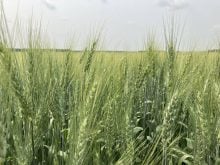Rain that has fallen across most of the Canadian Prairies and U.S. Northern Plains is shaking up farmers’ seeding plans, with last minute substitutions occurring as they race to meet crop insurance deadlines.The switch to faster maturing crops might bring bad news for feed grain price outlooks, but benefit the outlook for canola and durum, analysts say.”Don’t hold feed grains into the summer because we expect a flood of selling to come forward,” said the Wild Oats grain market advisory in a commentary June 1.”First, many farmers may seed barley instead of spring wheat or canola due to the lateness. Secondly, spring wheat seeded after June 1 has a high probability of being feed quality. We estimate that 25 percent of the Canadian wheat crop will be feed, resulting in burdensome supplies for the upcoming year.”Many farmers in Manitoba’s Red River Valley are expected to switch to barley and oats from canola because of the late seeding. Any canola seeded now will likely flower in the hottest part of summer, which could drastically reduce yields.South of the border, farmers are expected to increase canola acres in response to the rain, which hit patches of northern North Dakota.Oilseed crops are now seen as a better bet than spring wheat and durum, which are getting too late to plant.”It’ll lower wheat acres – durum particularly,” said Neal Fisher, administrator of the North Dakota Wheat Commission. “Crop insurance dates are looming.”Most of the hard red spring wheat area of eastern North Dakota was seeded in good time and was not badly hurt by the rains, but the durum area of northwestern North Dakota was “far, far behind the five year average” and rain delays will push farmers to consider other crops.Mike Krueger of The Money Farm in Fargo, N. D., said farmers lose too much yield potential with late seeded cereals so they’re moving into oilseeds.”It’ll probably mean a little less spring wheat and durum than we thought, and probably a little more canola, sunflowers, soybeans.”For those who were able to get their crops in the ground, the rain, heavy as it was, was good news for growers on both sides of the border.But one Saskatchewan farmer, frustrated with seeding delays, on the internet discussion site www.agri-ville.com has taken to calling the rain “soil poison” for preventing seeding, washing away nutrients and increasing salinity.Too much of a good thing can cause problems, said Fisher.”You have a personal dilemma in ever criticizing moisture because you need it, but it does bring some challenges when you want to put the crop in.”
Read Also

Why feds imposed EV tariffs
Moe and Kinew have a fight on their hands when it comes to eliminating the EV tariff. Canada has to worry about pissing off the U.S. and Mexico and hundreds of thousands of auto workers.















